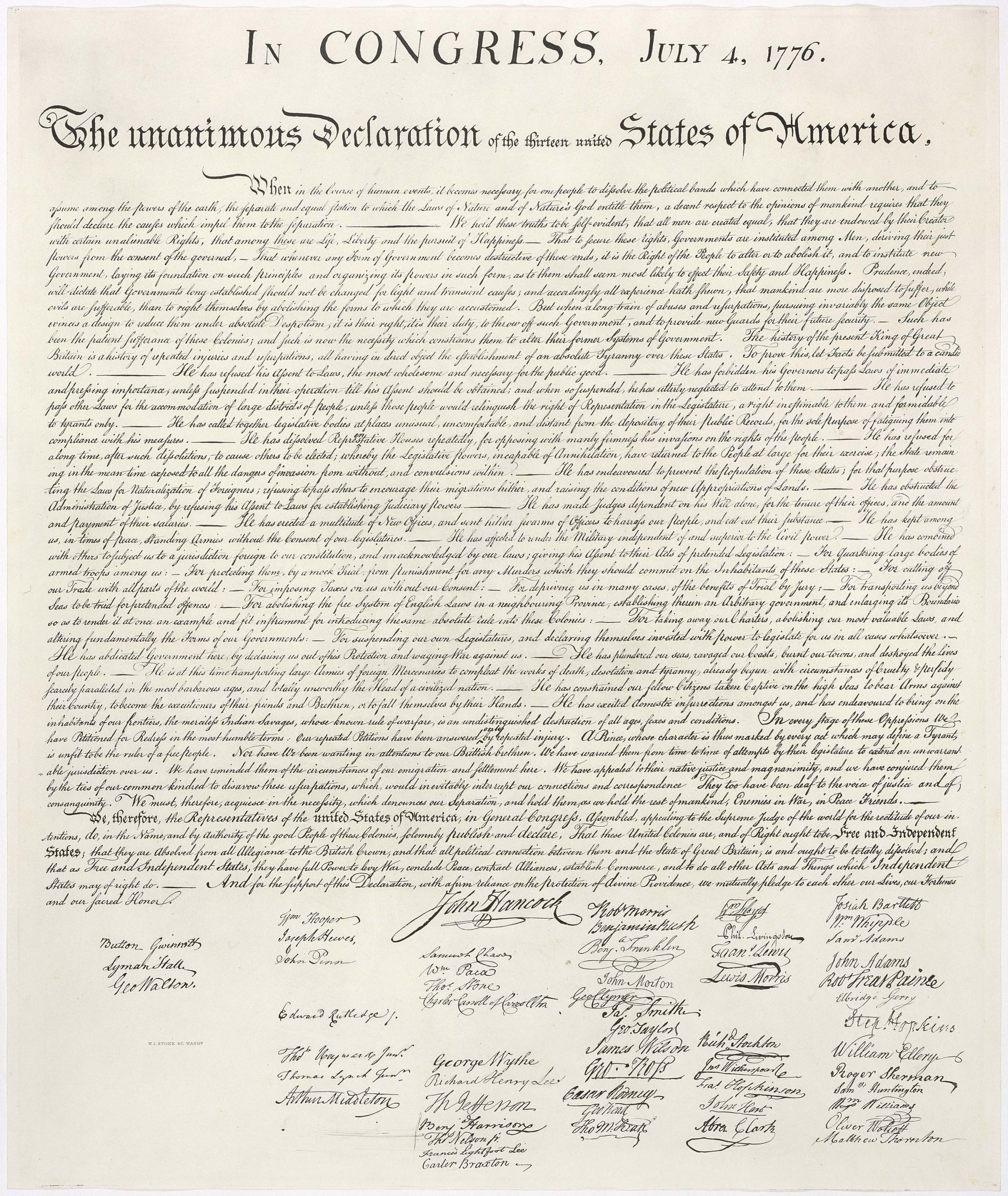86 Drafting of the Declaration (1776)

In Congress, Friday June 7, 1776. The delegates from Virginia moved in obedience to instructions from their constituents that the Congress should declare that these United colonies are and of right ought to be free and independent states, that they are absolved from all allegiance to the British crown, and that all political connection between them and the state of Great Britain is and ought to be totally dissolved. That measures should be immediately taken for procuring the assistance of foreign powers and a Confederation be formed to bind the colonies more closely together.
It appearing in the course of these debates that the colonies of New York, New Jersey, Pennsylvania, Delaware, Maryland, and South Carolina were not yet matured for falling from the parent stem but that they were fast advancing to that state, it was thought most prudent to wait a while for them and to postpone the final decision to July 1. But that this might occasion as little delay as possible a committee was appointed to prepare a declaration of independence. The committee were J. Adams, Dr. Franklin, Roger Sherman, Robert R. Livingston and myself. Committees were also appointed at the same time to prepare a plan of confederation for the colonies and to state the terms proper to be proposed for foreign alliance. The committee for drawing the declaration of independence desired me to do it. It was accordingly done and being approved by them, I reported it to the house on Friday the 28th of June when it was read and ordered to lie on the table.
On Monday the 1st of July the house resolved itself into a committee of the whole and resumed the consideration of the original motion made by the delegates of Virginia. Which being again debated through the day, was carried in the affirmative by the votes of New Hampshire, Connecticut, Massachusetts, Rhode Island, New Jersey, Maryland, Virginia, North Carolina, and Georgia. South Carolina and Pennsylvania voted against it. Delaware having but two members present, they were divided. The delegates for New York declared they were for it themselves and were assured their constituents were for it. But that [because] their instructions having been drawn near a twelvemonth before, when reconciliation was still the general object, they were enjoined by them [to] do nothing which should impede that object. They therefore thought themselves not justifiable in voting on either side and asked leave to withdraw from the question, which was given them. The committee rose, reported their resolution to the house. Mr. Edward Rutledge of South Carolina then requested the determination might be put off to the next day, as he believed his colleagues, though they disapproved of the resolution, would then join in it for the sake of unanimity. The ultimate question whether the house would agree to the resolution of the committee was accordingly postponed to the next day, when it was again moved and South Carolina concurred in voting for it. In the meantime a third member had come post from the Delaware counties and turned the vote of that colony in favor of the resolution. Members of a different sentiment attending that morning from Pennsylvania also. Their vote was changed so that the whole 12 colonies who were authorized to vote at all, gave their voices for it. And within a few days, the convention of New York approved of it and thus supplied the void occasioned by the withdrawing of her delegates from the vote.
Congress proceeded the same day to consider the declaration of independence which had been reported and lain on the table the Friday preceding and on Monday referred to a committee of the whole. The pusillanimous idea that we had friends in England worth keeping terms with, still haunted the minds of many. For this reason those passages which conveyed censures on the people of England were struck out, lest they should give them offense. The clause too, reprobating the enslaving the inhabitants of Africa was struck out in complaisance to South Carolina and Georgia, who had never attempted to restrain the importation of slaves and who on the contrary still wished to continue it. Our northern brethren also I believe felt a little tender under those censures, for though their people have very few slaves themselves yet they had been pretty considerable carriers of them to others. The debates having taken up the greater parts of the 2nd, 3rd, and 4th days of July were in the evening of the last, closed. The declaration was reported by the committee, agreed to by the house and signed by every member present except Mr. Dickinson. The sentiments of men are known not only by what they receive, but what they reject also.
Thomas Jefferson, Writings (edited by Paul Leicester Ford, 1892), I, 18-29. https://archive.org/details/in.ernet.dli.2015.45494/page/n561/mode/2up
